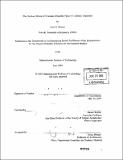The Morisco House in Granada : domestic space in cultural transition
Author(s)
Mosier, Lisa G. (Lisa Gayle)
DownloadFull printable version (4.249Mb)
Other Contributors
Massachusetts Institute of Technology. Dept. of Architecture.
Advisor
Nasser Rabbat.
Terms of use
Metadata
Show full item recordAbstract
This paper examines issues of cultural, religious, and personal identity as reflected in domestic space, with the premise that expressions of the built environment evolve from concepts of self. These themes are particularly apparent in the case of residential architecture of the Moriscos, a cultural group of former Muslims forcibly converted to Christianity in 15th and 16th century Spain following the Reconquest. The Morisco houses of Granada from 1500-1570 reveal architectural forms resulting from acculturation as well as desires to protect identities and traditions in the midst of threat of cultural extinction. The architectural elements of these residences may be read as subversive attempts by a subordinated cultural group to conceal meaning from the dominant Christian population.
Description
Thesis (S.M.)--Massachusetts Institute of Technology, Dept. of Architecture, 2005. Includes bibliographical references (p. 48).
Date issued
2005Department
Massachusetts Institute of Technology. Department of ArchitecturePublisher
Massachusetts Institute of Technology
Keywords
Architecture.